Alberto Contador: Blowing the Tour de France apart
A decade on, a look back at the stage 19 attack which changed the course of the 2011 Tour
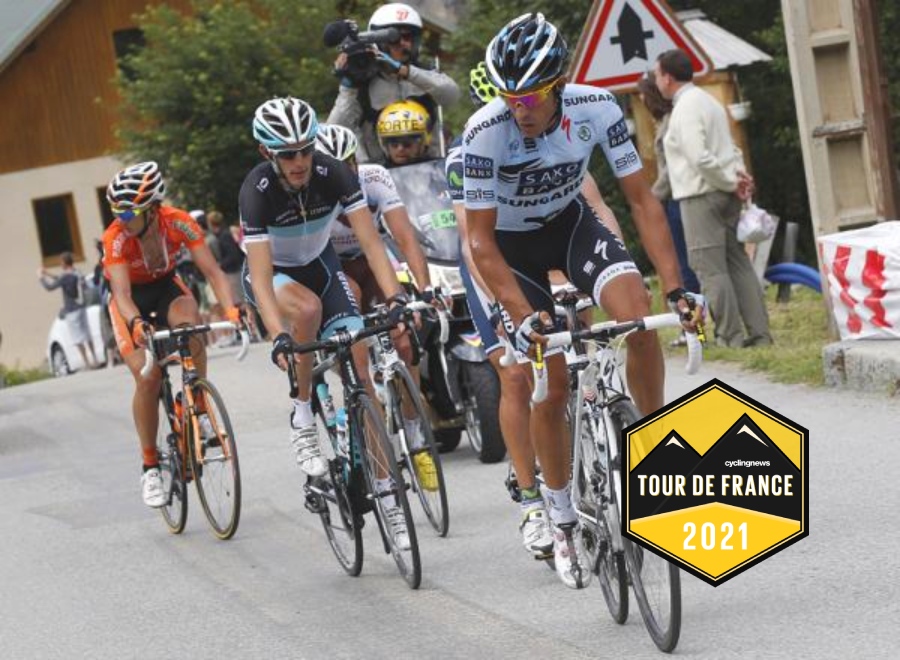
There are many reasons why stage 19 of the 2011 Tour de France, the last in the mountains of that year's race, has lingered so long in the memory. Part of its appeal is that rather than providing a resolution, the results of stage 19 created a fresh crop of possible GC outcomes, crowned by the most important of all: with 48 hours left before Paris's final finish line, there was still no absolute certainty about who would win the 2011 Tour de France.
But the one reason that neatly contains all the rest is that from beginning to end, stage 19's short, fierce, and breathless charge across the Alps was consistently high drama. There was no downtime whatsoever. And stages in the Tour that manage to maintain their internal tension that high for that long are very rare beasts indeed.
The stage in 1995 to Mende airport, when ONCE all but hijacked Miguel Indurain's fifth Tour de France courtesy of a long-range attack by Laurent Jalabert is one of the few classic modern-day examples. The 2013 Pyrenean stage when Richie Porte, Sky's second leader, was dropped early on and eventual winner Chris Froome was isolated in a lead group crammed with rivals could be another.
But arguably to find a day as fraught from start to finish – and, it has to be said, a stage with far more dramatic long-term consequences – you'd have to go back to the 1971 Tour, when Eddy Merckx suffered his ever worst defeat at the hands of Luis Ocaña after getting dropped on the first climb on the road to Orcières-Merlette.
1971 had another non-stop nail biter two days later, too, when Merckx and a small gang of allies and team-mates attacked even before the start flag had dropped, and Merckx was still out front in Marseilles, a mere 251 kilometres later.
The 2011 stage might have been far shorter, with three Alpine climbs packed into 109.5 kilometres, but they weren't just any Alpine climbs. Kicking off with an ascent of the first-category Telegraphe, after a quarter of an hour's fast downhill, the route then moved onto one of the Tour's best-known climbs, the 18 kilometres Hors-Categorie Galibier. Then, after almost an hour of descending, the final mountain challenge of the 2011 Tour came in the shape of the most mythical Alpine ascent of them all: the Alpe d'Huez.
If this was the 27th time the Tour would tackle the Alpe d'Huez in its history, the Galibier was already a wearily famiiar sight to the Tour's peloton that year. The day before, on stage 18 they'd already been up the other side, to celebrate the centenary of the Galibier's first appearance in the Tour. That had hardly been a slow burner of a stage either.
Get The Leadout Newsletter
The latest race content, interviews, features, reviews and expert buying guides, direct to your inbox!
Instead, after what had been a fairly conservative, tightly knit race up until that point, Andy Schleck had lit the fuse 60 kilometres beforehand, on the Izoard, and he reached the summit of the Galibier more than two minutes on his closest rival - his brother Frank. France's Thomas Voeckler, a sentimental favourite among the host nation, had clung onto the overall lead for a tenth day by a scant 15 seconds, while another top contender, Cadel Evans finished close behind Frank Schleck but was now nearly a minute back overall.
However, the biggest loser had been Alberto Contador. The overwhelming pre-race favourite, having won all six of his previous Grand Tours – although CAS's confirmation of his sanction for a clenbuterol positive would later cause him to lose the two most recent of that collection including the 2011 Giro d'Italia – Contador had endured a torrid start to the Tour, with four crashes in nine days producing a bad knee injury.
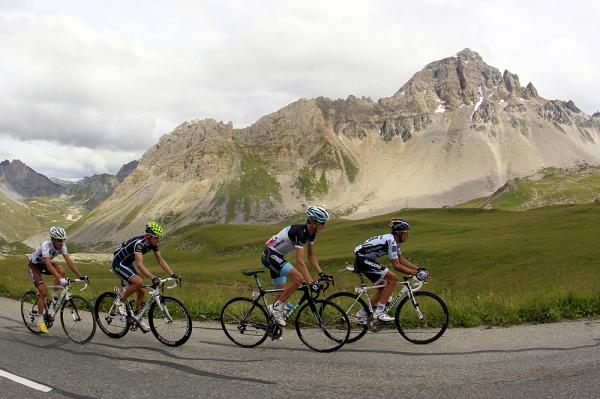
Although he regained some time with a hair-raising downhill attack into Gap on stage 16, Evans' counter-charge to try and limit the damage on Schleck on the Galibier had left Contador in serious trouble. By the summit he was nearly four minutes down on Schleck, effectively ending his GC bid.
Yet rather than that setback, the first in a Grand Tour since 2007, making Contador waver, his defeat seemingly hardened his resolve to try and leave his mark on the race, no matter what – and go on the attack on the Telegraphe, almost as soon as stage 19 had begun.
"I had decided to do that attack two minutes after I'd got on the team bus after the Galibier stage," Contador told Cyclingnews. "Blowing up so badly that day was due to not eating enough at the right times, because if you see what I'd done on the Col de Manse a few days before" – the second cat climb before Gap where Contador attacked with Cadel Evans, gaining time on Andy Schleck – "or how I rode in the time trial after Alpe d'Huez, I was actually in good shape.
"So, I made really sure after the Galibier stage that I ate and drank correctly, because my energy levels were really low. And because the next day, I had to try to blow the race apart.
"That night I looked at the route in detail, got the mechanics to fine tune the bike perfectly and have the best kinds of ultra-narrow wheels, so I'd attack at soon as the climbing began.
"I didn't care if I went alone or if I went with anybody else. I wasn't exactly pissed off, but I knew I deserved to be further up the GC than I was. So, I had to break the race apart and at the same time think outside the box a bit.
"I told Bjarne Riis [Saxo Bank manager] what I had planned about attacking from the run and we even tried to have a bike at the top of the Galibier with special wheels for the downhill and flatter part, but the race situation was such we couldn't do that…"
This total disregard for standard race strategy marked a pattern that would become familiar in the second, post ban, era of Contador's career. Whenever he found himself forced out of the GC battle by injury or misfortune or simply because he'd been outraced, Contador would bounce back as soon as he could and attempt to tear up the script regardless.
The most famous of these trademark attacks would come the following year when he won an entire Vuelta a España by staging an ambush at Fuente De, and the most emblematic would be when he won on the Angliru on the second last day of his career in 2017.
"The 2011 Tour followed the exact pattern of what happened in 2016 in the Vuelta, too, when I lost time on the Aubisque stage but then attacked on the road to Formigal the next day," he reflected, an attack what saw him take eventual overall winner Nairo Quintana with him and blowing the race apart in the process. But in 2011 when Contador charged away just as the Tour went past a signpost for Village d'Arc, he was heading into relatively unknown territory and its effect on a peloton was all the more devastating.
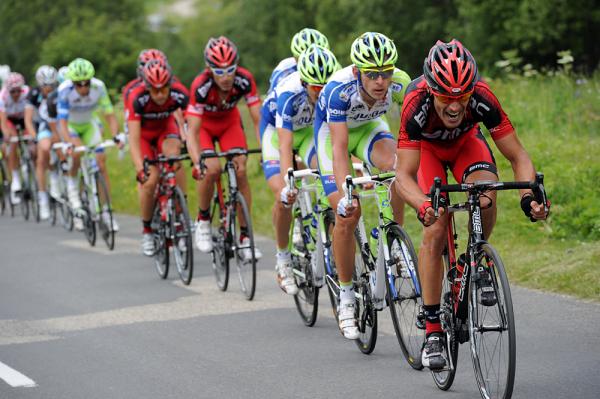
While most of the bunch seemed unable to react, Andy Schleck, Evans and Voeckler were among the three able to get across. However, Contador's second furious stomp on the pedals, out of the saddle and shoulders rocking from side to side in his typical pre-ban style when at maximum effort, left both Voeckler and Evans reeling and only Schleck could stay in the Spaniard's shadow.
The Frenchman, it quickly emerged, was not actually on the point of cracking, but simply had less power in his engine than his rivals. Evans, on the other hand, had a problem with his bike that left him in need of what later emerged to be e multiple replacements and was way further back. Schleck, as he gamely stuck to Contador's back wheel, was clearly able to keep in contention.
But on a day where questions of the 'what ifs?' and 'what the hells?' variety emerged with almost every kilometre, for a moment it felt as if Contador was trying to go on Mission Impossible and win the Tour.
"I didn't care if Andy was there or not," Contador told Cyclingnews, "I was there to do my own race. Maybe if he hadn't been there, I'd have had a bit more room for manoeuvre because I was further down overall. But I didn't care. I just had to go at my own pace, keep a very high rhythm, but I couldn't go really deep and try and drop Andy, because that would have caused me to have my own crisis. So I had to go very fast, use the terrain and see if I got as far as Alpe d'Huez with some kind of a gap."
Over the top of the Telegraphe and onto the Galibier, the situation hovered in a kind of stalemate. For kilometre after kilometre, Voeckler remained between 20 and 30 seconds behind a group of four – Contador, Andy Schleck, Christophe Riblon and Rui Costa – while somewhere between a minute and two, Evans' BMC team, with some help from Liquigas, gradually and painfully closed the gap.
But with so far to go, and on a day where the favourites had made such a huge move so early in the day, the sense that anything could yet happen was overwhelming. One manoeuvre that had one expert in long-distance moves, Laurant Jalabert, publicly scratching his head in his role as a French TV pundit was Voeckler's strategy of chasing solo.
Isolated for much of the climb and digging ever deeper to try to keep in contact in Schleck - his biggest threat on GC - Voeckler seemed incapable of realising that his best options lay in waiting for his three team-mates in the Evans group behind, rather than trying, fruitlessly, to get across to Schleck and Contador.
"With a clear head, I'd say that I lost second place overall, at the Tour on the Col du Galibier. I shouldn't have tried to follow Alberto Contador and Andy Schleck at all costs," Voeckler later told L'Equipe. "I wasn't thinking clearly. My directeur sportif should have ordered me to stop. It was an error, but that's how it was."
What helped maintain the tension all stage long was that the gaps were never that huge. On the Galibier, Contador and Schleck had an advantage of 30 seconds at most on Voeckler until about three kilometres to go when he began to flail wildly, even flinging a bidon to the ground in frustration at his own fading strength.
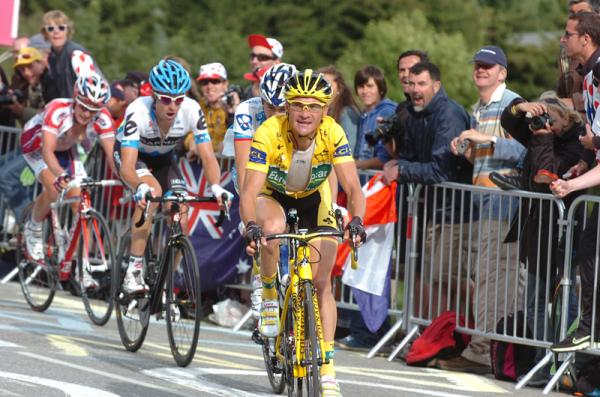
Schleck seemed only willing or able to provide limited support to Contador, providing fuel for another major round of 'what ifs?' Had he opted to help Contador more, he could have pushed Evans out of the fight – something that was definitely troubling BMC's director, John Lelangue, as he sat in the team car behind the Australian: "We've never seen John Lelangue so nervous in a race," French TV motorbike reporters said.
However, to judge by his minimal collaboration, while it could well have been that he lacked the strength, it looked as if Schleck was more worried about Contador than the other, more realistic threats like the Australian.
As for Contador himself, his long-range attack had no objective other than to see what he could achieve. It was its own purpose. "I went for it, simply to see what I could do," he said later. "The pressure was off, and I wanted to enjoy myself."
After burning up his team-mates, a long solo drive by Evans, following Basque outsider Samuel Sánchez, left him well within reach of Voeckler, who finally realised he should sit up and regain the protection of no less than three following team-mates.
As their pursuers swapped places, Contador and Schleck, joined by Sánchez shortly afterwards, still only had 34 seconds on Evans at the top of the Galibier – where Schleck had the honour of being the first ever Tour rider to cross the summit in first place on consecutive days. Voeckler was at 1:30. So much had happened, then, yet there was still so much to play for.
The long descent from the summit of Galibier, initially speeding over the road paint and graffiti from the previous day's stage but in the opposite direction and then on down the valley to Bourg d'Oisans and the start of the ascent to Alpe d'Huez., essentially allowed for a re-set of the whole scenario.
After an hour-long pursuit, Evans' small group of chasers regained contact with Schleck and Contador, and then the Europcar and FDJ-driven peloton swelled the ranks of the favourites' peloton even more. However, for all the French TV commentators trumpeted about Voeckler's apparently revived chances of defending his maillot jaune for an eleventh day, in fact the writing was on the wall.
"He'd already told me on the Galibier to go for my own chances," said Pierre Rolland later as he and Ryder Hesjedal led the Tour onto the lower slopes of the Alpe d'Huez. But while Contador had helped forge the GC battle on the Galibier at no advantage to himself, on the Alpe d'Huez, the Spaniard would be the only previous protagonist with the strength left to fight for the stage win.
Nine kilometres from the summit, he darted away up the Alpe, quickly overhauling Rolland and Hesjedal and striking out alone. But once again, the gaps were never huge: 20 seconds on Rolland, 40 or so on a group containing both Schlecks and Evans, and where Voeckler had once again, dropped behind.
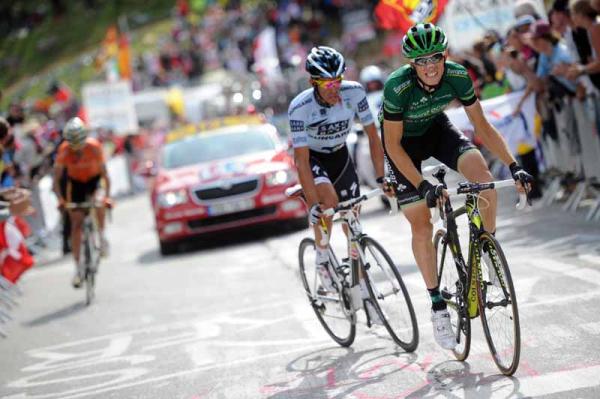
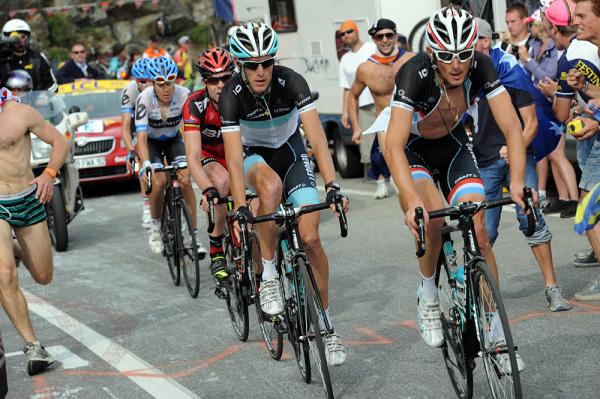
Surprisingly little actually happened for the next half hour, but the tension was as sharp as a knife. Contador might be sticking to his attitude that he had nothing to lose and was racing accordingly, but elsewhere the sense that anybody and everybody was vulnerable was palpable.
Andy Schleck's conservatism on the Alpe might be partly due to his knowing that if he didn't crack, then he'd automatically inherit the yellow jersey from Voeckler. Evans' tenacity even after such a complicated start to the day made it clear he wouldn't be rolling over that quickly.
But Contador's attacks on the Galibier, Voeckler's desperate chase, and Evans' 50-kilometre struggle to regain contact were ample reminders, too, that after three weeks of hard racing, all it took was one all-out attack for a GC hierarchy to disintegrate.
That attack never came. There was one longish surge from Cadel Evans right at the foot of the climb, another some three kilometres from the summit, both of which felt like moves to test his rivals for chinks in their armour without going too deep into the red himself. Instead, the one effective assault from the peloton came from another victim of Andy Schleck's big attack on the Galibier the day before: Samuel Sánchez.
Already a winner at Luz Ardiden, repeating the emblematic victory of another Euskaltel-Euskadi rider, Roberto Laiseka, ten years before, Sánchez lurched out of the peloton on a left-hand bend with nine kilometres to go. It took him the best part of six kilometres to catch Contador, for all he was much less than a minute ahead – yet another sign of how many of the peloton were running on fumes by this stage – and when he did so, he had Pierre Rolland glued to his back wheel.
Previously caught in no-man's land between Contador and the main pack for a considerable length of time, Sánchez bridging move provided the young Frenchman with just the support he needed.
As soon as the duo reached Contador, after a couple hundred metres where Rolland could not shake the Spaniard, the Europcar pro suddenly spurted away, alone towards the summit. Sánchez, who received a regal bawling out from Contador for reasons unknown, tried to stay on Rolland's wheel. But ultimately, he had to settle for second and a definitive move into the lead of the King of the Mountains' competition, while Contador drifted home in third.
"From the moment they reached me, I knew it was pretty much over. I knew that they were stronger by then, and Rolland had raced it very intelligently, sticking on Sánchez back wheel and then going for it in the last kilometre where it was flatter," Contador said.
"It was impossible to follow him. I'd been 90 kilometres flat out, but while I was doing well on Alpe d'Huez, what I'd done at the start made me lose a bit at the end of it all."
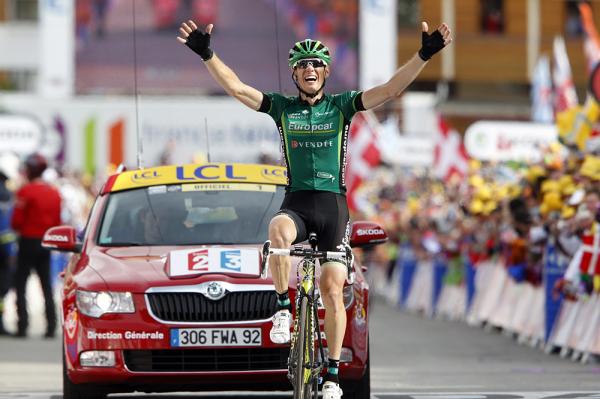
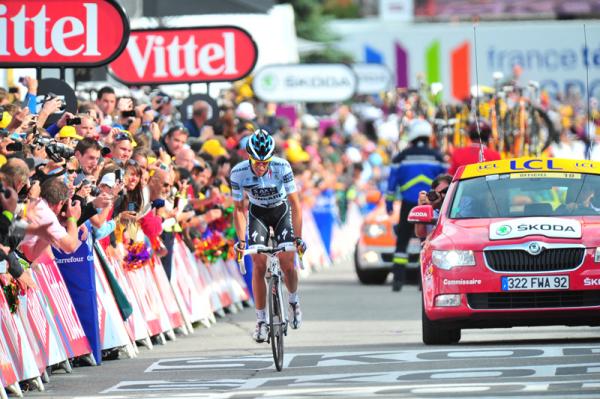
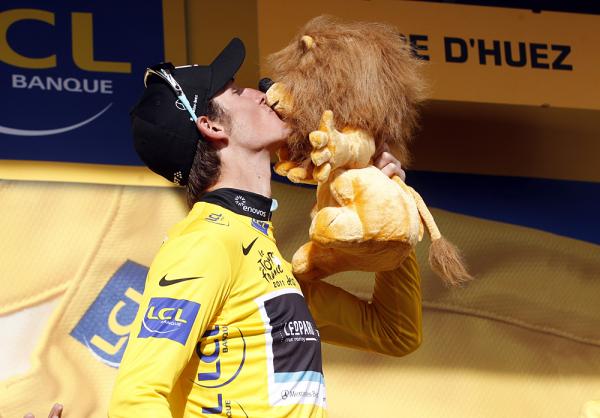
For Rolland and Europcar, victory on Alpe d'Huez could not act as a full compensation prize for losing the overall lead to Schleck. But it certainly must have taken the edge off the hurt. Victory on the stage gave them not only the first local win on the climb since Bernard Hinault in 1986, but they also took the white jersey with Rolland as Rein Taaramäe – yet another victim of the general carnage – fell behind.
Yet for all the damage wreaked out in just 109 kilometres and a little more than three hours of racing, the battle for the Tour was still not resolved. Andy Schleck's advantage of 57 seconds over Cadel Evans might have netted the Luxembourg rider his first maillot jaune on Alpe d'Huez, but the urban myth that whoever wore yellow at the top of the Alpe d'Huez would be riding into Paris in yellow would take yet another hammering.
Perhaps that was the most attractive feature of stage 19: it had been a heart-stopper of a stage from beginning to end, with multiple options for multiple jerseys constantly on the table (there were even rumours Mark Cavendish might lose his green jersey until commissaires relented and let those outside the time cut back into the race.) But in fact, for all three jerseys had changed hands, the GC battle remained open.
Evans was the big favourite for sure, but – as we saw most recently last year in the Tour – a final time trial is never 100 per cent certain to favour the top time triallists. A single moment of inattention, a sudden loss of strength and the yellow jersey might have stayed in Luxembourg for the second year running (post CAS stripping Contador of the 2010 win) rather than heading to Australia for the first time in history.
But that was the next day's stage to decide. For the man who had engineered it all, Contador paid his one and only visit to the Tour's podium that year, as the most combative rider of the stage. It was richly deserved, but it felt like a scant reward after so much effort.
If 2011 marked the start of the Contador years as a rebel with (or without) a cause, the last mountain stage of that year's Tour was also the end of an era.
The time for anarchic attacks, in the Tour de France if not the Vuelta or Giro, ended there and then, as from 2012 onwards each July the 'Sky train' took over, grinding out such an effective, constant pace on the climbs for Wiggins and then Froome that, barring accidents like 2014 or anomalies like the 2016 Vuelta, the Contadors of this world were kept on a much tighter leash.
The French though, had also learned a lesson. "Rolland broke a kind of curse," French cycling journalist Pierre Carrey tells Cyclingnews. "He'd shown that it was possible for the French to win big races, against big names."
As for Contador's opinion on what he achieved, and didn't achieve, that day?
"I'd done attacks like that before, but never in such a big scenario," he reflected. "In Paris-Nice I'd tried moves like that, and then on the Manse, I'd gone for it there in the Tour. But it had been a terrible Tour start for me. So, in a sense I had no choice. I had to go for it.
"Maybe, if I'd waited until Alpe d'Huez to attack, rather than going all out from the start on the Telegraphe, I could have been stronger and I might have won. Maybe. But I wouldn't remember that stage with such fondness, and the same goes for a lot of spectators, too..."
Alasdair Fotheringham has been reporting on cycling since 1991. He has covered every Tour de France since 1992 bar one, as well as numerous other bike races of all shapes and sizes, ranging from the Olympic Games in 2008 to the now sadly defunct Subida a Urkiola hill climb in Spain. As well as working for Cyclingnews, he has also written for The Independent, The Guardian, ProCycling, The Express and Reuters.
